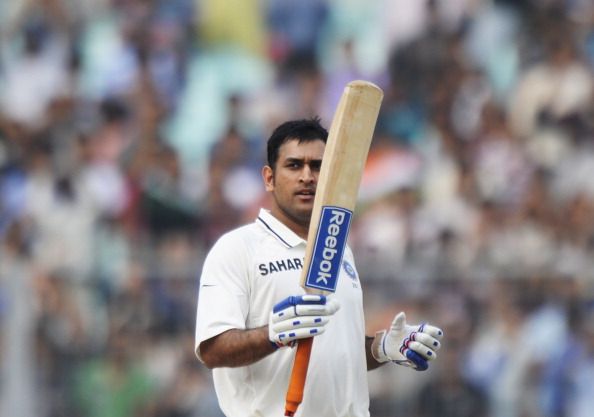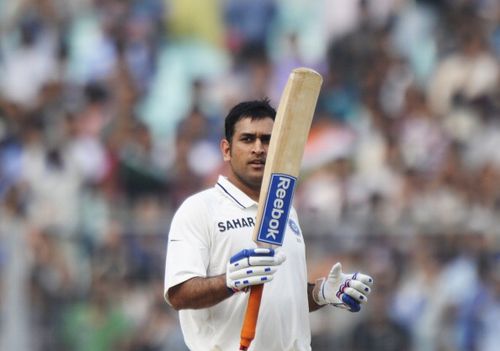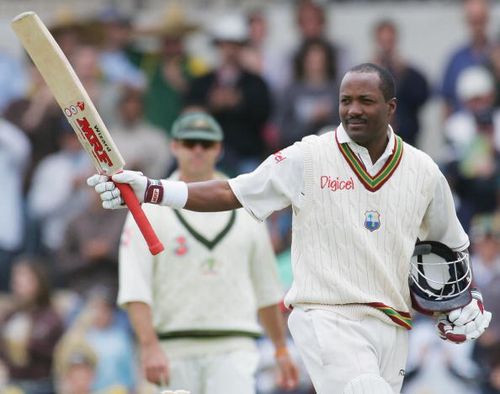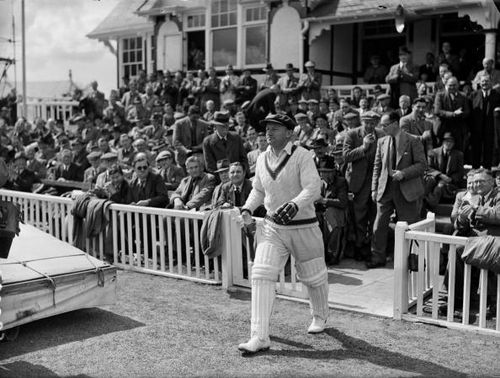
Top five innings played by Test match captains
Over the last 136 years, many captains have played game changing knocks and so it was difficult to narrow down the list to five top innings from the Test match captains. But I laid down certain parameters like the context of the match and how the innings from the skippers changed the course of the games. The accolades that followed are also mentioned. I could not accommodate many wonderful innings like Lara’s 400 or Saleem Malik’s 237 against Australia, scored after following-on, because those innings did not result in victory.
Here are my top five innings played by Test match captains:

File Photo: Indian cricket captain Mahendra Singh Dhoni raises his bat after scoring a century.
5) Mahendra Singh Dhoni- 224 vs Australia at Chennai in 2013, First Test
Context of the match:
This was the first Test match of the series and India’s recent Test record was not good. They had a point to prove, especially after losing a home series against England in late 2012. So when, Australia arrived on the Indian shores, India was determined to put up a good show.
At Chennai, Australia won the all important toss and batted first. The ball turned even on day one as Australia posted a challenging total of 380, thanks mainly to their skipper Michael Clarke, who scored a magnificent century.
When India batted they had lost couple of quick wickets. But Tendulkar and Kohli counter attacked. When Tendulkar was dismissed for 81, India’s scorecard read four down for 196 with the match evenly poised.
Why the innings was important:
Dhoni attacked the bowling right from the outset and never let any bowler settle. But Australia kept picking up wickets at regular intervals to peg back the Indians. When Harbhajan was dismissed India had a slender lead of 26. But Dhoni then took over, and along with Bhuvaneshwar Kumar, took the game away from Australia. Kumar held the fort while Dhoni went berserk at the other end. The duo put together 140 for the ninth wicket and Dhoni’s 224 was the highest Test score by an Indian captain.
Australia found the spinning wicket too hot to handle in the second innings and lost the Test by eight wickets. Dhoni’s innings was the clear differentiating factor in the final outcome of the match.
Accolades:
Former India coach Greg Chappell believed that Dhoni emphatically answered his critics with his 224, which according to Chappell was the best innings he had seen. Opposition captain, Michael Clarke acknowledged the fact that Dhoni’s innings had changed the game.
4) Greg Chappell – 123 and 109* vs West Indies at Gabba, Brisbane in 1975- First Test
Context of the match:
This was Greg Chappell’s first match as a Test match captain. Australia steamrolled past West Indies by eight wickets thanks to Chappell’s hundreds in each innings of the match. What a start to his captaincy career.
Why the innings was important:
West Indies squandered the advantage of batting first with reckless shots and were all out for 214. Greg Chappell top scored in the first innings with a quick fire 123 in which he drove with elan. His back foot play was equally compelling.
In the second innings he made the mockery of the West Indies attack scoring an unbeaten 109. The feature of his batting was also his footwork against spinners Lance Gibbs and Inshan Ali.
These couple of innings broke West Indian spirits and for the rest of the series they were found wanting against various aspects primarily against pace battery of Thomson and Lillee. Australia won the six match series 5-1.
Accolades:
Chappell established his supremacy as the world’s best batsman. Wisden dubbed the pitch as a “badly under-prepared wicket” but praised Chappell for scoring hundred in each innings.
3) Graham Gooch- 154* vs West Indies at Headingley in 1991, First Test
The context of the match:
England fielded a young side, giving debuts to three players Graeme Hick, Mark Ramprakash and Steve Watkin. They won their first Test match against West Indies on home soil after 22 long years. In 1969, Ray Illingworth’s men had beaten West Indies on the same venue.
England had a slender lead of 25 on a surface where the ball was moving. The four pronged pace attack of Curtly Ambrose, Patrick Patterson, Malcolm Marshall and Courtney Walsh was expected to exploit these conditions. They certainly asked many questions to the top-order batsmen.
Why the innings was special:
Gooch was obdurate in his defence and never looked like getting out. No one looked as assured as the England skipper. He had to battle the series of disasters at the other end and had endured a tough initial phase. But his impeccable concentration and unflappable temperament ensured England reached a position of safety in the Test match.
Gooch’s seven and half hours of top quality batting had eighteen boundaries. His ascendancy can be gauged from the fact that the next highest scorer was 27. Gooch and Pringle put 98 for the seventh wicket, which proved to be decisive in the end. Gooch was in total control of the partnership and inspired Pringle to play positively.
West Indies found the target of 278 very difficult to chase as the ball was doing all the tricks. they ended up losing the game by 115 runs.
Accolades:
Gooch was awarded the man of the match award for his century. In 2001, Wisden rated this innings as the third best innings with total rating of 252.

File Photo: Brian Lara of the West Indies celebrates after scoring a century against Australia.
2) Brian Lara- 153* vs Australia at Bridgetown, Barbados in 1998/99, Third Test
The context of the match:
Australia won the toss and decided to bat on a wicket that looked good. The tourists posted 490 in their first innings with Steve Waugh notching up 199 and Ricky Ponting scoring 104. West Indies in reply lost six wickets for 98 and were staring down the barrel. Opener Sherwin Campbell and wicket-keeper Ridley Jacobs put an enterprising stand of 153 for the seventh wicket. The follow-on was averted and West Indies finished their first innings at 329.
In the second innings, West Indies bowled superbly as Australia crumbled in 50.1 overs for 146. Courtney Walsh was the tormentor-in-chief picking up five wickets. West Indies needed 308 to win in four and a half sessions. By the end of day four, Australia picked up three wickets for 85 runs. Lara was batting on two when the day ended.
Why the innings was special:
The destiny of West Indies was in the hands of Lara – the magician. After battling for 28 minutes at the crease on day four, Lara came back on day five with a lot of confidence. He began solidly but West Indies lost two quick wickets and the scorecard read 105 for five.
Lara was toying with the Australian bowlers. He was conquering their minds and threading the smallest gaps with precision. When the eighth wicket fell, West Indies needed 60 runs to win. But No.10 Curtly Ambrose obstinately held the fort for 82 minutes while Lara was flourishing at the other end. There was one awkward moment when Glenn McGrath hit Lara on the head with the second new ball. The ensuing altercation between Lara and McGrath spiced things up.
Ambrose was dismissed when West Indies were six runs shy of the target. Courtney Walsh survived a few anxious moments. His five ball stay at the crease increased the entire nation’s heart rate. But Lara was determined to see the team through. He creamed Jason Gillespie to the covers off the 256th ball of his epic innings to register a fantastic one-wicket victory for West Indies.
Wisden refers to the report of the Barbados newspaper Daily Notion, which headlined this as the Match of the Century. Writer Haydn Gill said, “It will go down in the history books as one of the most spirited ever revivals, the victory coming from the depths of despair.”
Accolades:
In 2001, Wisden rated this innings as the second best innings ever played in Test cricket. Lara’s genius, his focus and single-mindedness scripted this magnum opus. The second highest score in the innings was 38, which just underlines Lara’s dominance. Wisden gave this innings a rating of 255.2.

File Photo of Australian cricketing legend Sir Don Bradman.
1) Don Bradman- 270 vs England at MCG in 1936/37, Third Test
The context of the match:
Don Bradman became Australia’s new captain at the 1936/37 home Ashes series. Australia lost the first two Test matches at Brisbane and Sydney by 322 runs and innings and 22 runs respectively. The third Test match was at the Melbourne Cricket Ground. Bradman won the toss on the 1st January 1937. He batted on a wicket that was a ‘ glue-pot’. They finished day one at 181 for six and he declared the innings on the second day, which saw rain interrupting the course of the play on many occasions, at 200 for nine.
England declared their first innings at 76 for nine, conceding a lead of 124 runs and wanted to have a go at the Australian top-order. But Bradman astutely sent his tailenders Bill O’Reilly and Chuck Fleetwood- Smith to open the innings and by the end of day’s play Australia only lost the former. On the next day of the match, which was a Sunday, the teams rested. On Monday, Australia were precariously placed at 97 for five.
Why the innings was special:
Bradman walked into bat to accompany Jack Fingleton. The conditions had improved for batting. Bradman batted with assurance and dominated the English bowling. Bradman and Fingleton batted for the whole of Monday and a few minutes on Tuesday. The duo added 346 for the sixth wicket, which stood for 72 years until it was broken by Mahela Jayawardene and Prasanna Jayawardene against India in Ahmedabad, when they added 351 runs.
Bradman carried his innings to Wednesday morning, until he was caught by English skipper Gubby Allen. Bradman batted for 458 minutes for his 270 runs and had scored 110 singles. The Australian total reached 564 runs, which was quite an amazing recovery considering how they had lost wickets in a heap on day three. England lost the game by 365 runs.
According to Chris Harte’s A History of Australian Cricket (p. 373), “The match had virtually brought Melbourne to a standstill. The Sun News Pictorial commented: ‘There will be no rise in bread prices while the Test cricket is on. A meeting of the Master Bakers’ Council that was to take place yesterday to consider an increase has been postponed until Thursday afternoon, as the Council was unanimous that watching Bradman yesterday was more entertaining than risking the wrath of housewives by raising prices.”
Accolades:
Wisden rates this innings as the best Test match innings ever played. Bradman’s marathon knock not only won Australia the game but it changed the course of the series. Australia were trailing by 0-2 but with Bradman’s tactics of sending the less skillful batsmen higher up the order and then cashing in when the conditions improved worked wonders. Australia won the next three Test matches to win the series 3-2. In the Test match history Australia is the only side to win the five match series after losing the first two matches.